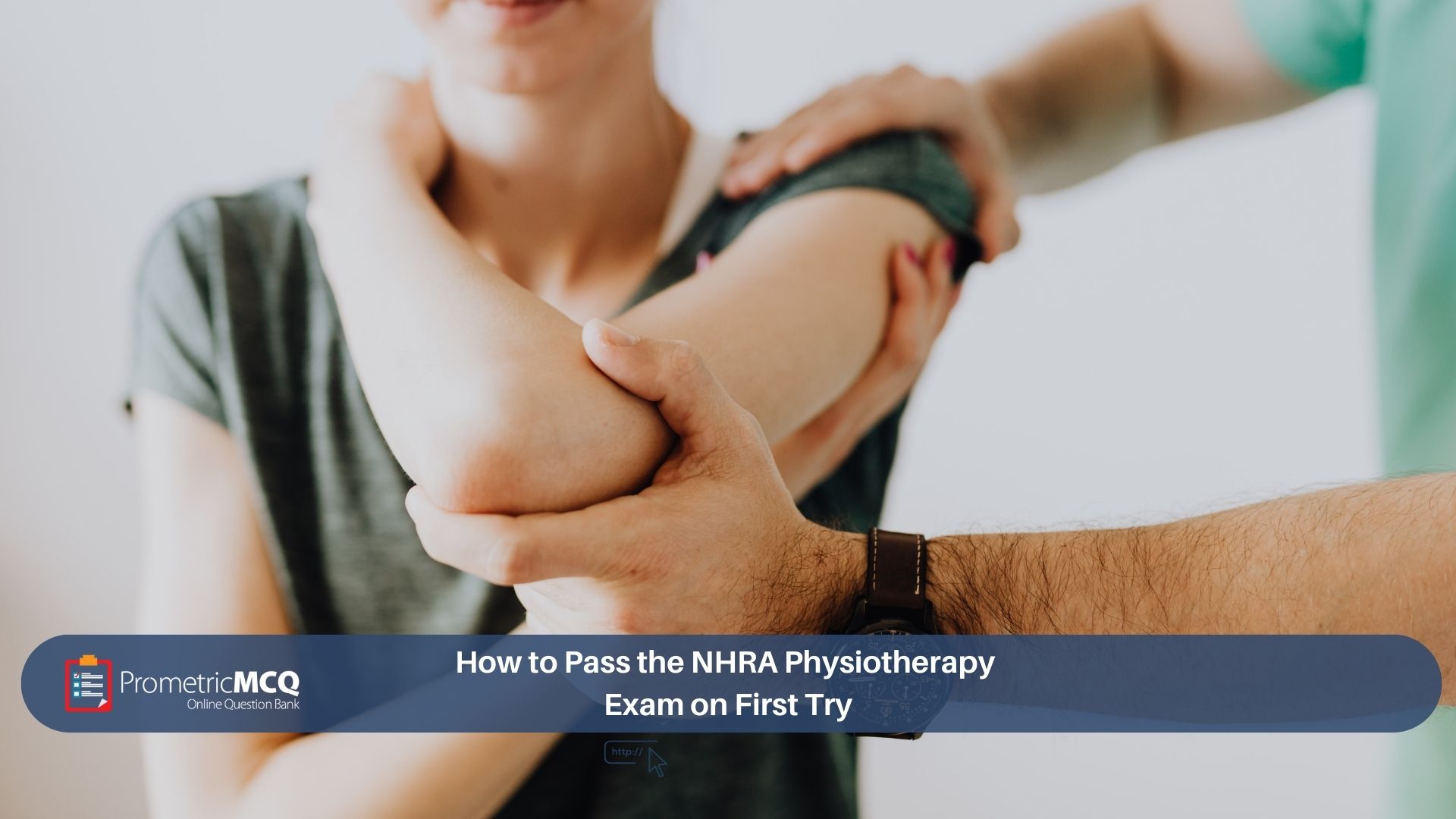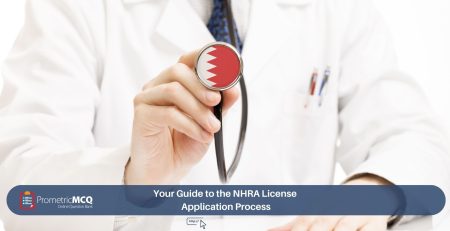
How to Pass the NHRA Physiotherapy Exam on First Try
fatima@prometricmcq.com2025-09-18T19:44:14+00:00Table of Contents
ToggleHow to Pass the NHRA Physiotherapy Exam on First Try (2025 Guide)
For physiotherapists worldwide, the Kingdom of Bahrain represents a pinnacle of professional opportunity, boasting a rapidly growing healthcare sector that values high standards of patient care. The key to unlocking a career in this vibrant nation is passing the National Health Regulatory Authority (NHRA) Physiotherapy Licensure Exam. This is not just a formality; it is a comprehensive assessment designed to ensure that only the most competent and clinically astute practitioners are licensed to serve the community. The prospect of facing this high-stakes exam can be daunting, but with the right strategy, passing on the very first attempt is not just possible—it’s an achievable goal.
Success on the NHRA exam is not a matter of luck or last-minute cramming. It is the direct result of a structured, disciplined, and intelligent preparation strategy. This involves more than just reviewing textbooks; it requires a deep understanding of the exam’s pattern, a laser focus on high-yield clinical topics, and the mastery of case-based clinical reasoning through extensive MCQ practice.
This ultimate 2025 guide has been meticulously crafted to be your definitive battle plan for first-try success. We will provide a proven, multi-phase study schedule, a granular breakdown of the most critical syllabus domains, advanced tips for tackling complex MCQs, and a comprehensive 10-point FAQ to eliminate any uncertainties. Our mission is to transform your preparation from a source of stress into a structured process that builds unshakable confidence for exam day.
Key Takeaways for First-Try Success
- Strategy Over Volume: A structured 8-10 week study plan is more effective than months of unfocused reading.
- MCQ Practice is Non-Negotiable: Your success is directly correlated to the number of high-quality, timed MCQs you solve. Aim for at least 2,000-2,500 questions.
- Master the “Big Two”: Musculoskeletal and Neurological Physiotherapy constitute the largest and most challenging portions of the exam. Prioritize them.
- Know Your Red Flags Cold: Patient safety is paramount. Questions testing your ability to identify contraindications and red flags are guaranteed.
- Simulate the Real Exam: Taking multiple full-length, timed mock exams in your final weeks is the single best way to prepare for the pressure and pacing of the actual test.
Understanding the Battlefield: The NHRA Physio Exam Blueprint
Before devising a strategy, you must understand the exam’s structure. As outlined in our general guide to the NHRA exam pattern for all professions, the physiotherapy exam follows a standardized format.
- Administrator: Prometric
- Format: Computer-Based Test (CBT) with 100% Multiple-Choice Questions (MCQs).
- Structure: 150 MCQs to be completed in 3 hours (180 minutes).
- Pacing: This allows an average of 1 minute and 12 seconds per question.
- Passing Score: The official result is Pass/Fail, with the unofficial benchmark for physiotherapy being around 55-60%. To guarantee a first-try pass, your target in practice tests should be a consistent 70% or higher.
The Ultimate 8-Week Study Plan for a First-Try Pass
This intensive schedule is designed for a working professional. It demands discipline but is structured to cover all necessary ground efficiently.
Phase 1: Foundational Reinforcement (Weeks 1-3)
The goal of this phase is to refresh your core knowledge and build a strong foundation. Do not get bogged down in excessive detail.
- Week 1: Musculoskeletal (Lower Limb & Spine): Review the anatomy, biomechanics, special tests, and common pathologies of the hip, knee, ankle, and lumbar/cervical spine. Focus on conditions like osteoarthritis, ACL/meniscal tears, and disc herniation.
- Week 2: Musculoskeletal (Upper Limb & Thorax): Cover the shoulder, elbow, wrist, and thoracic spine. Master concepts like rotator cuff pathology, impingement syndromes, and thoracic outlet syndrome.
- Week 3: Neurological Physiotherapy: Focus on the “big three”: Stroke (CVA), Spinal Cord Injury (SCI), and Traumatic Brain Injury (TBI). Review assessment scales (GCS, ASIA, Modified Ashworth), principles of neuroplasticity, and key treatment approaches.
- Daily Task: Dedicate 2 hours per day to content review. Use a trusted textbook (e.g., Magee’s Orthopedic Physical Assessment, O’Sullivan’s Physical Rehabilitation). At the end of each day, solve 25 untimed MCQs on the topic you studied to solidify your learning.
Phase 2: Intensive MCQ Application (Weeks 4-7)
This is the most critical phase. Shift your focus from reading to active problem-solving. This is where you build the skills to pass.
- Week 4: Cardiopulmonary & General PT: Cover cardiac/pulmonary rehabilitation, therapeutic modalities (indications/contraindications), and gait analysis.
- Weeks 5-7: Mixed Review & Timed Practice: Stop studying by topic. Each day, complete a block of 50-75 MCQs from a mixed-topic QBank like a dedicated physiotherapy MCQs bank.
- The Golden Rule of this Phase: Spend more time reading the rationales than answering the questions. For every question, understand why the correct answer is right AND why the incorrect options are wrong. Keep a “mistake log” of concepts you struggle with for targeted review.
- Daily Task: Dedicate 2-3 hours per day. Start with untimed blocks in Week 4, then transition to strictly timed blocks (1 minute per question) from Week 5 onwards.
Phase 3: Final Simulation & Refinement (Week 8)
The goal of this final week is to build mental endurance, perfect your timing, and solidify your confidence.
- Day 1, 3, and 5: Take a full-length, 150-question, 3-hour mock exam under strict exam conditions. No interruptions.
- Day 2, 4, and 6: Meticulously review the mock exam you took the previous day. Focus on your mistake log and do a light review of your weakest areas.
- Day 7: Rest. Do not cram. Your brain needs to consolidate the information. Do a light 30-minute review of your notes, then relax. Ensure you have all your documents (passport, confirmation email) ready for exam day.
Passing on the first try is not about knowing everything. It’s about having mastery over the most frequently tested concepts and possessing a flawless exam-taking strategy.
Frequently Asked Questions (FAQs) for a First-Try Pass
The top three reasons are: 1) Poor time management during the exam, 2) Insufficient practice with high-quality, case-based MCQs, and 3) A superficial understanding of core musculoskeletal and neurological concepts, especially special tests and red flags.
The NHRA physiotherapy exam is overwhelmingly based on international clinical standards and evidence-based practice. There is very little, if any, content specific to local Bahraini regulations. Your focus should be on universal physiotherapy principles, as promoted by bodies like World Physiotherapy.
A subscription to a high-quality, specialized physiotherapy question bank (QBank). This is the most efficient and effective tool for active learning, identifying your weaknesses, and simulating the exam environment. Passive reading of textbooks is not enough.
First, reread the question to ensure you haven’t missed a key detail. Next, use the process of elimination. Often, you can confidently rule out two of the four options. This increases your guessing odds to 50%. Look for keywords that might point to a specific condition. Since there’s no negative marking, never leave an answer blank.
Yes, you should have the standard range of motion (ROM) values for all major joints memorized (e.g., Shoulder Flexion: 0-180°, Knee Flexion: 0-135°). These numbers are fundamental and can be easily tested.
It is 100% mandatory. Passing the exam is only one step. You will not be issued a license to practice until the DataFlow Group has successfully completed Primary Source Verification of your qualifications and experience. It is advisable to start this process in parallel with your exam preparation if possible.
Consistency is key. It’s better to study for 1-2 focused hours every day than to cram for 8 hours on a weekend. Use the “dead time” in your day—your commute, your lunch break—to review flashcards or do a few practice questions on your phone. The 8-week plan outlined above is specifically designed for working professionals.
Focus on safety and contraindications. You must know the absolute contraindications for modalities like ultrasound (e.g., over a pacemaker, malignancy, pregnant uterus) and electrical stimulation (e.g., over the carotid sinus, thoracic region for patients with pacemakers). Also, know the basic parameters for achieving specific physiological effects (e.g., thermal vs. non-thermal ultrasound).
There is typically a waiting period before you can re-apply for the exam. More importantly, you are usually only allowed three attempts in total. This is why a dedicated “first-try” strategy is so important. Investing fully in your first attempt saves you time, money, and stress.
Finding a resource that aligns with the NHRA blueprint is essential for targeted preparation. A platform that offers a wide range of MCQs covering all physiotherapy domains is your best tool. You can find such dedicated resources in comprehensive MCQs packages.
Conclusion: Your Blueprint for Confidence
Passing the NHRA Physiotherapy Exam on your first attempt is a testament to your dedication and strategic preparation. It is a formidable challenge, but it is a predictable one. The exam rewards those who respect its focus on clinical reasoning, patient safety, and evidence-based practice. By following the structured plan in this guide—prioritizing active learning through MCQs, mastering high-yield concepts, and simulating the exam environment—you are not leaving your success to chance. You are building a foundation of knowledge and confidence that will carry you through exam day and into a rewarding career in the Kingdom of Bahrain.
Ready to Turn Your First Try into Your Only Try?
Our premium NHRA Physiotherapy QBank is meticulously designed with hundreds of high-yield clinical scenarios, special test questions, and full-length mock exams that mirror the real test. Build your confidence and master the material today.










